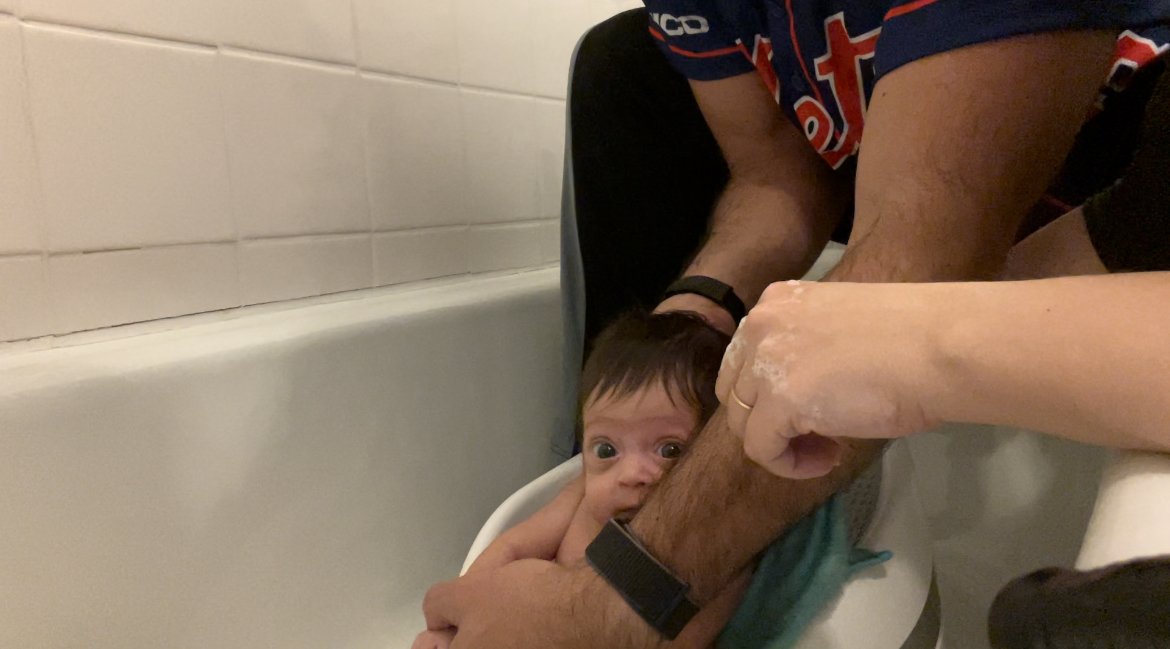After 80 long days in the NICU, my 10 week early daughter Mirren has finally come home. We’re overjoyed and we’ve begun the task of learning how to manage all the logistics of her care—while somehow doing the bare minimum of that for ourselves. We both showered in the last 24 hours, which is a major moral victory for the team.
TFW you’re small and slippery and you realize your parents have no idea how to give you a bath.
Over the last two and a half months in the hospital, I’ve actually been fairly productive—no doubt setting the record for VC term sheets offered literally from inside the NICU (three). Turns out being in a quiet place with good WIFI minding someone who basically just eats and sleeps most of the time while tethered to all manner of monitors actually makes for a great work environment for venture capital.
She’s even been on several board calls already and last week showed up on her first pitch call.
Home is a different story.
Being at home with her versus spending 4-6 hours at the hospital each day has been a round the clock effort on both our parts—requiring a ton of attention. We’ve come up with staggered sleep schedules, which is helping, but we’re still in sleep deprived parent fog. Still, there’s no more important and meaningful task in our lives right now and we imagine we’ll feel like that for quite a while.
That’s why I can’t imagine ever taking a job where I don’t have the flexibility to prioritize my family. In fact, it’s why many startup folks leave the early stage world to go over to the big company side—because the benefits tend to be much better.
A lot of smaller startups are complaining that it’s super difficult to recruit talent right now, but few are differentiating their offering. They’ll try to sell you that they’re building the coolest tech and that you’re going to want to be a part of the future of whatever industry they’re in, but I seriously doubt that’s going to close the deal for anyone.
I would propose that early stage startups start thinking about doing something radically different—think about trying to become the absolute best place to work if you have a family as a means of getting an advantage in the hiring market.
Consider extended family leave—six months paid at minimum for all parents of all genders. I mean, think about it—if you have to pay a recruiter to hire someone, you’re paying, on average, 25% of their first year salary anyway. Plus, you can allow people to vest into the program. Maybe if you’re there at least six months you get three months, if you stay a year, you get six months, and if you stay at least 3 years, maybe you get a full year. Paying out that year three years into the future will seem like a bargain in hindsight, especially if they wind up staying afterwards. Or, just do the six months acroess the board—it doesn’t seem to be hurting Spotify.
How about paying into childcare costs, adoption, or IVF too? Again, if you’re thinking about the money side of this, consider the overall cost of not being able to hire and consider how undifferentiated your current benefits options are.
Talent is a marketplace—and if you think about trying to carve out your part of the market around parents could make a lot of sense when you consider how much of a zag it is to everyone else’s zig.
Everyone’ else promotes their “fast-paced” environment and gets you to put Slack on your phone on day one. Many times, that kind of thing can be code for, “You’re 100% going to get burned out working here because you’re surrounded by a bunch of other people with no management experience who have never worked at a world class operations to see how it should even run.
I’d like to see a startup come out and say, “We run at a speed that will allow you to accomplish a lot, but also have the same co-workers seven years from now when we IPO because we won’t burn anyone out. This will leave you with enough energy and time for a family—so you’re not going to have to leave because of a life change. That also makes our senior management much more gender diverse—which tends to lead to better decision making and collaboration.”
The most experienced startup professionals are at an age where they’re either having families or thinking about it. It’s time to make your recruiting process look a little less like the code competition scene in Facebook. These people are more focused, can multi-task better, and generally have a top tier sense of empathy.
Take a little more dilution, raise a little more money, and spend on the most ignored personal goal in the market.

